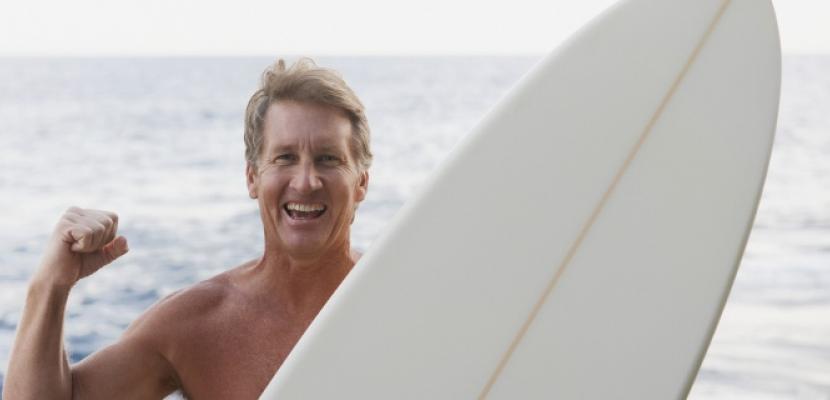
Bond University researchers are offering free health checks for Gold Coast surfers after discovering 97 per cent of a surf session was spent in a weight supported environment, raising concerns of bone deterioration leading to osteoporosis.
The health checks are part of a research project that aims to document the bone health of mature-aged surfers to determine if long-term surfing had a negative effect on bone density, leading to an increased risk of fractures and often resulting in osteopenia and osteoporosis.
Dr Vini Simas (MD) of Bond University's Water-Based Research Unit will investigate bone mineral density and body composition of mature-aged surfers, and is calling for local male surfers aged between 50 and 75 who have been surfing for the past 15 years to join the study.
"Age-related bone deterioration is a major health problem concerning mature-aged men and is a principle concern for clinicians," he said.
"Right now, the bone health of surfers is unclear so we want to study this cohort to determine if they are more susceptible to the premature development of osteoporosis.
"The outcomes of the investigation into the long-term effects of surfing on bone health will determine whether preventative measures and recommendations are needed to reduce the risk of bone deterioration."
Dr Simas said previous analysis of recreational surfers found that on average, they spent only 2 to 8 per cent of a surfing session standing on the board, affording the bones little stimulus for developing.
"Surfers spend an average of only three minutes in every hour actually surfing a wave, while the rest of their session is spent in a weight supported environment, for example, paddling or sitting on the board," he said.
"This suggests that those participating in this aquatic activity may have an imbalance between bone reabsorption and bone production activity, which can present the risk of premature osteoporosis and increased risk of fractures."
The study will be a simple and non-invasive process for participants that includes a brief survey regarding their physical activity and current calcium intake, and a standard diagnostic test - a Dual Energy X-Ray Absorptiometry (DEXA) scan - which will provide an accurate assessment of bone health and body composition.
Dr Simas is also calling for surfers to be involved in a second research project that investigates exostoses, commonly known as 'surfer's ear'.
The study requires males and females over the age of 18 with at least five years surfing experience who surf a minimum of five sessions a month, 12 months a year.
Dr Simas said surfer’s ear is the development of abnormal bony growths in the external ear canal as a result of being exposed to cold water and wind.
He said it is a painful and problematic condition that could cause balance problems, hearing loss and chronic ear infections.
“If left undetected and untreated, severe cases of surfer’s ear can require surgery, which involves going under the skin and drilling into the bone,” he said.
“Fortunately, early detection and intervention is key to stopping these issues developing and this is ultimately what we hope to achieve through our research."
Dr Simas said simple measures like keeping your ear canal warm and dry with ear plugs could potentially halt the progress of surfer’s ear, but most surfers don’t realise they have the condition.
"According to a Victorian study, 87 per cent of male surfers and 69 per cent of female surfers have some degree of surfer's ear," he said.
"At the Quiksilver Pro Gold Coast last year, I assessed 10 top male and five top female surfers, where it was revealed every one of them suffered from surfer's ear.
"We want to get as many participants involved as possible to raise awareness and investigate causes and preventative measures for the condition."
The study will require participants to fill out a survey prior to commencement, followed by a standard otoscopic exam of the ear canal.
To get involved with either of the above studies, contact Dr Vini Simas on vpsimas@gmail.com or 0405 617 133.

